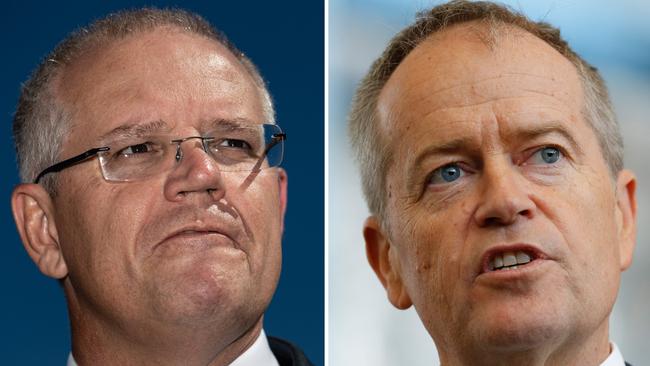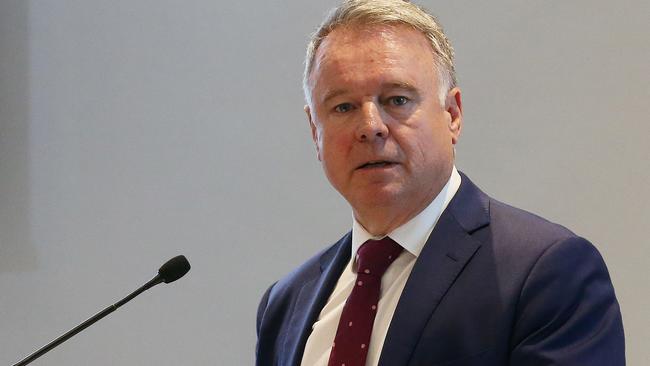ALP now at a crossroads following disastrous election results
The ALP is now at a “crossroads” after losing an unlosable election. Whether the party recovers — or not — depends on one key choice.

Federal Election
Don't miss out on the headlines from Federal Election. Followed categories will be added to My News.
As Labor reels from Saturday’s shock election defeat, the party now faces an undeniable dilemma if it hopes to recover.
The ALP, which was founded on working class ideals, must now choose between supporting those battlers — or causes close to the hearts of the growing number of inner-city environmentalists.
That’s according to Labor frontbencher Joel Fitzgibbon, who faced a grilling over the party’s disastrous election fallout from Radio National Breakfast’s Fran Kelly this morning.
RELATED: Liberals to win key Sydney seat
RELATED: Red flag even Shorten didn’t see
Mr Fitzgibbon’s electorate sits in the “Labor heartland” of NSW’s Hunter Region, and while he seems likely to cling to his seat, he suffered a 14 per cent collapse in his primary vote, while One Nation’s Stuart Bonds picked up 22 per cent.
He said that result largely came down to the ALP’s focus on climate change at the expense of jobs — a focus he said the next leader would have to reverse.
“We certainly have to get back to the centre and reconnect with our working class base, reconnect with those blue collar workers and talk more about them and their cost of living pressures, and less about some of those issues that are more aligned with the left side of the debate,” he said.

He said Labor’s unclear stance on the Adani coal mine, for example, had caused some in his own coal mining electorate to believe the party didn’t back the wider mining industry.
And while the environment was important, Mr Fitzgibbon stressed the ALP’s next leader must speak “at least as much” on the issues that matter to working Australians, like job security.
“This is maybe our only opportunity to ensure that at the next election we have re-engaged back with our base and got ourselves back to the centre,” he said, adding he would consider running for Labor leader if other contenders failed to put “regional Australia back on the policy agenda.”
THE EXPERT
Dr Stewart Jackson, from the University of Sydney’s Department of Government and International Relations, said regional Australia had especially turned its back on Labor, with many rural voters feeling neglected by the party.
In fact, according to an ABC analysis, “swings came in against Labor in many regional centres across Australia”, particularly in Cessnock and Grafton in NSW, Burnie in Tasmania and Ipswich, Rockhampton and Mackay in Queensland.
“People in the city aren’t talking about rural Australia,” Dr Jackson told news.com.au, adding that job security was even more vital for many country voters.
“Yes, we should be concerned about the environment — everyone is concerned — but what’s first and foremost on people’s minds? How the government is going to guarantee jobs, how they’re going to pay for a house and have the material things they want,” he said.
He said Labor was increasingly threatened by the Greens, who were able to pick up many inner-city votes — but that the gaping divide between progressive environmentalists and country workers had now left the party at a “crossroads”.
“That is the true challenge for Labor — the Greens will focus on the environment, but Labor is going to have to think about how they will get the biggest number of votes — and that’s going to be material conditions,” he said.

He said if the party was going to oppose something that affected jobs — such as Adani — it had to offer an alternative solution in order to keep votes, and that it was time to stop dismissing the Liberals as “the big end of town”.
On the other hand, he said the Coalition had succeeded by sticking to its guns and repeating a message of security and prosperity that voters flocked to.
“I didn’t think Morrison was much chop before but now I’m reassessing that — he ran a good campaign and the Coalition played to its strengths. Morrison ran a presidential-style campaign and it worked — Shorten never quite fired up the imagination,” he said.
Dr Stewart said Australian elections tended to be won based on a party’s past performance rather than its vision for the future, and that he expected it to be many years before another “big target” campaign was seen again.
Continue the conversation @carey_alexis | alexis.carey@news.com.au
Originally published as ALP now at a crossroads following disastrous election results



